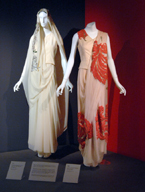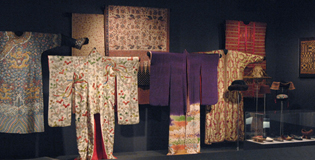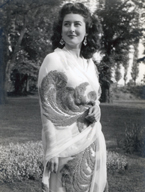|
Click images for more information
Fashion and
textile designers often take their inspiration from “exotic”
styles originating in “foreign” cultures. But for whom is
something exotic and foreign? During the centuries of European
expansion, exoticism encompassed most of the non-Western world.
Historically, this meant that European designers, such as Paul
Poiret and Yves Saint Laurent, appropriated design elements from
places as diverse as Asia, Africa, and the Middle East. But this
exhibition demonstrates that exoticism in fashion has changed
profoundly as we have moved from the Eurocentrism of the past to
the hybridity of today’s “global village.”
The concept of the exotic has many positive connotations -- unlike related words such as “strange” and “alien.” Exoticism has typically been suffused with romance, sexuality, and novelty. Just as spices and silk traveled along trade routes, so too have fantasies and stereotypes of the exotic, mysterious “other.” This romantic conception of the exotic crystallized in the 19th century during the heyday of Western colonial expansion. Edward Said famously argued in his book, Orientalism, that exoticism patronizes and misrepresents other cultures. Yet other scholars have suggested that “the presentation of one culture for consumption by another” can also promote cultural dialogue. As the anthropologist Clifford Geertz notes, “To see ourselves as others is eye opening.” As a result of globalization and multiculturalism, exoticism is becoming much more relativistic. Japanese designers such as Kenzo launched hybrid East-West styles as early as the 1970s. Today, designers from Brazil, Turkey, and Korea show their collections in Paris and New York. India and China also are becoming major fashion players. Although Western brands still dominate the fashion scene, emerging markets and the Internet are giving rise to a wealth of local fashion centers and there are many young designers with new perspectives on what constitutes exoticism.  November 27, 2007 -
May 7, 2008
November 27, 2007 -
May 7, 2008
|


